动词搭配讲与练
英语使役动词用法详细讲解与练习

• 3). make+宾语+形容词,宾语亦可是从句. • The news made her happy. • He made it clear that he objected to the proposal.
• 2 “半使役动词”amaze, astonish等
• “半使役动词”在英语语法上还是一个没有被认同的概念或术语,而只 是认可了其v-ing形式和v-ed形式作为形容词使用。但这类词汇数量较 大,使用频率高,业已成为学习和考查中的重点、难点、易混易错点, 而且在教学一线已经广泛地被教师和学生所接受。半使役动词之所以 得名,一则它们的意义都有“使某人感到……”,再则是为了与具有特殊 用法的使役动词let, have, make等区别开来。
宾补之间是一种主动关系。而且还可以与情态动词will, would连用,不 用于被动结构。
• The rich lady had the singer eat with his servants. • I will have him come and help you.
• 2). have+宾语+现在分词:表示让某人或物连续进行某动作或处于 某状态中,宾语和宾补是一种主动关系。亦可转化为“劝说,鼓励” 宾语干某事。
• 2.4常见的半使役动词 • amaze(使某人感到惊呀), astonish(使某人感到惊奇), • bore(使某人感到厌倦), complicate(使某人感到复杂), • confuse(使某人感到迷惑), disappoint (使某人感到失望), • delight(使某人感到高兴), discourage(使某人感到气馁), • distinguish(使某人感到显著), excite (使某人感到兴奋), • encourage(使某人感到鼓舞), exhaust (使某人感到疲倦),
常见动词与介词之间的搭配法和练习

英语考试中固定搭配是重要的夺分点积攒大量的词组是十分必要的。
在各种英语考试中不乏这样的例子。
下面是整理一些考试中常见的固定搭配同学们要认真体会、学习哦。
一、add 1 If you add 5 to 5you get 10.lt把……加到……上面gt Five added to five is/makes 10. 2 This will add to our trouble.lt增加gt The balloons added to the festival atmosphere.lt增加gt 3 His whole school education added up to no more than one year.lt加起来总共gt 4 Add up the numbersand you will get 1155.lt加……gt 题组训练用与add相关的短语填空1、The engine of the ship was out of order and the bad weather added _______the helplessness of the crew at sea. 2、The numbers add _______95. 答案1、to 2、up to 二、agree 1 agree onlt就……达成共识gt 2 agree to do sth.lt同意做某事gt agree to the plan/decision/arrangementlt同意gt 3 I dont agree with you/what yousaid/your advice.lt同意gt The climate here doesnt agree with me.lt指食物、天气等适合某人gt Your story agrees with what I have already beard.lt和……一致gt 题组训练用与agree相关的短语填空3、Mutton doesnt agree ________________ him. 4、The verb agrees ________________ its subject in number and person. 5、We couldnt agree________________ a date. 答案3、with 4、with 5、on 三、break 1 I am sorry that I broke my promiselt违背违反gt break ones word/break the law/break the rule 2 His health broke.lt身体或精神垮了gt 3 He broke away from all his old friends.lt断绝来往脱离gt 4 I should break away from such habits.lt改掉习惯gt 5 All our plans broke down. The peace talks have broken down. lt计划、谈判等失败gt Her health broke down under the pressure of work. become very badlt被搞垮垮掉gt The telephone system has broken down.lt机器或车辆出故障坏掉gt 6 The thieves planned to break into a bank.lt闯入破门进入gt 7 The Second World War broke out in September 1939.lt爆发gt 8 After midnightthe party broke up.lt散会gt 9 I broke up the candy and gave each child a small piece.lt分开gt The police broke up the crowd.lt分开分散gt 10 broken Englishlt鳖脚的英语gt 11 Our troops had little difficulty in breaking through the lines of the police.lt突破gt 题组训练用与break相关的短语填空6、News reports say peace talks between the two countries have broken __________ with no agreement reached. 7、Fire broke____________ last night. 8、Sentences can be broken _____________ into clauses: 9、Youve been working so hard for nearly a month. Relax yourselfor you will break_______sooner or later. 10、While we were watching TVa voice broke ______the programme to announce the election results. 答案6、down 7、out 8、up9、down 10、into 四、bring 1 He brought about a quarrel between his parents.lt引起造成gt 2 She made every effort to bring about a peaceful solution to the problem.lt实现gt 3 Electricity lines as well as telephone poles were brought down by falling trees or branches.lt使倒下gt 4 bring down priceslt降低价格gt 5 The sale brought in over200.lt赚得gt 6 Dirt often brings on disease.lt引起gt The fine weather is bringing the crops on nicely.lt使成长更快使提高gt 7 Can you make a sentence to bring out the meaning of the phrase.lt讲解清楚gt 8 Joe was born in Texas but brought up in Oklahoma.lt抚养gt 9 He was so ill that he brought up everything.lt呕吐gt 10 This brought me into touch with various kinds of workers.lt和各种名词连用进入某种状态gt 11 Please bring forward the matter at the next meeting.lt提出gt They have brought the meeting forward to next Monday.lt把……提前提早gt 题组训练用与bring相关的短语填空11、The war in Iraq was________________ by the American President Bush. 12、The work can________________ 2000 a year. 答案11、brought about 12、bring in 五、call The trouble calls for quick action by the government.lt要求gt 1 I will call for you at five oclock.lt来找某人gt 2 We called for the packages at the post office.lt来取某物gt 3 I formed the habit of calling in on him in the evenings.lt顺便拜访gt 4 Your father is illyou should call in a doctor at once.lt找来请来gt 5 People dont like being called names.lt骂人gt 6 Theyve called off the game because of the thick fog.lt取消gt 7 He called upon me to speak immediately after himlt请叫某人做某事gt 8 I called on the people of this country to work hard for national unity.lt号召gt 9 A notice displayed in the shop window called attention to the recent increase in prices.lt引起……的注意gt 10 The army was called in to cut through fallen trees and to help clear the roads and paths.lt召集gt 11 call in at some place/call in on sb. /call back/call up/give sb. a call/make a calla long—distance call 题组训练用与call相关的短语填空13、The situation calls ________________ immediate action. 14、The sound of happy laughter called ________________ memories of his childhood. 15、Could you call in ________________ Mum on your way home 答案13、for 14、up 15、on 六、carry 1 He had learned enough German to carry on a conversation.lt 进行gt 2 One person should carry on where the other had left off.lt进行下去gt 3 I was chosen to carry out our experiment.lt执行开展gt 4 He did not carry out his promise to us.lt履行gt 5 After destroying the villagethe enemy carried off all the cattlelt抢走gt 6 The work is toughbut it is the person to carry it through.to complete sth. successfullylt顺利完成顺利实现gt 题组训练用与carry相关的短语填空16、They are trying to carry ________________ a new policy. 17、What a pityThey should have carried________________ the.good business. 18、—Its a good idea. But whos going to carry ________________ the plan —I think Tom and Greg will 答案16、out 17、on 18、out 七、come 1 How come that you didnt get here in timelt用于引申意义发生某情况gt 2 He came to realize that he was mistaken.lt渐渐地表示动作逐渐变化的过程gt 3 My dream has come truelt变成现实gt 4 He talked about his coming trip to the United States.lt即将到来的gt 5 How did the accident come aboutlt发生造成gt 6 I came acrosscame upon/ran acrossthis book in an old bookstore on the Fourth Avenue.lt无意中碰到找到gt He came suddenly across an idea.lt无意中想到gt 7 He just asked me to come round for supper.lt到这儿来gt 8 Come alongArthurwe cant wait all daylt快点gt 9 Come alongSomeone must know the answer to my question.lt快说gt 10 This paper comes out every Friday.lt出版gt 11 I think the roses will come out next week.lt开花发芽gt 12 I came out first in the examination.lt考试结果……考第……一名gt 13 The bill comes to 5.lt总计gt 14 When it comes to mathematicsI know nothing about it.lt谈到涉及gt 15 The robbery did not come to light until the next day.lt被发现被大家知道gt 16 The question hasnt come up yet.lt被提出gt 17 He came up with an idea.lt提出gt 18 come to oneselflt苏醒过来gt 19 come to an endlt结束gt 20 come into effectforcelt生效gt 21 come to a conclusiondecisionlt作出结论决定gt 22 come into beingexistencelt开始存在、建立、产生gt 23 come into powerlt开始执政gt 题组训练根据句意完成句子19、Im as good acook as she is except when it ____________makingpastry. 我做饭做得和她一样好就是不会做油酥馅饼。
动词填空练习讲解 (加情态动词或助动词)

动词填空六种时态的构成及用法(1)一般现在时用法:①现在经常性的状态或动作;②客观事实和真理。
构成:①be+表语;②实义动词作谓语标志词:often, sometimes, usually, always, never,twice a month, every day/week/month/year...(every 系列)例句:He usually gets to school early.他通常很早到校。
The moon moves around the earth.月亮绕着地球转。
练一练1.认识从实践开始Knowledge practice.2.如果明天下雨,我们就不去公园了。
If it tomorrow,we to the park.【答案】1. begins with.2.rains,won’t go(2)一般过去时用法:表示过去的动作或状态。
构成:①was/were+表语;②实义动词作谓语标志词:a moment ago,just now,...ago, yesterday, last night/week/month...(last系列)例句:We went to Yunnan last Monday.上周一我们去了云南。
1.She (not visit)her aunt last weekend.2.My friend,Lucy, (study)for the math test and (practice)English last night.【答案】1.didn’t visit 2.studied practiced(3)一般将来时用法:表示将来的动作或状态。
构成:①will/shall+动词原形;②am/is/are going to+动词原形标志词:tonight, tomorrow, from now on, soon, in the future, next year...(next系列)例句:The twins will go to the cinema with their parents tonight. 这对双胞胎今晚将和他们的父母一起去看电影。
动词用法详解 史上最小白的讲解与练习

初中英语分类练习——动词部分【复习目标】▲掌握动词的种类情况。
▲掌握动词不定式的用法。
【课前准备】●要求学生对所学动词进行归类记忆。
【知识要点】(一)动词的种类动词是表示动作或状态的词,按其词义和在句子中的作用可分为行为动词,连系动词,助动词和情态动词。
1.行为动词行为动词可分为及物动词 (vt)和不及物动词(vi),及物动词表示动作或状态,有完整的词义,能单独作谓语,后跟宾语;不及物动词表示动作或状态,有完整的词义,能单独作谓语,但后面不能直接跟宾语,如要带宾语则与介词或副词构成短语。
如:More and more people study English.(vt)The students are listening to the teacher carefully.(vi)2.连系动词连系动词本身有一定的词义,但不能独立作谓语,必须与表语一起构成谓语。
常用的连系动词有 be, get, turn, become, look, feel, grow, seem, sound, taste, smell等。
如:Our country is becoming stronger and stronger.It feels damp.3.助动词助动词本身无词义,不能单独作谓语,只能和主要动词一起构成谓语动词,表示否定,疑问及动词的时态、语态、人称和数等语法特征,助动词有 be,do,have,shall,will等。
如:How do you usually come to school?The children are playing yo-yo now.4.情态动词情态动词本身有一定的意义,但不能独立作谓语,只能和主要动词原形一起构成谓语,表示说话人的语气和情态。
情态动词没有人称和数的变化。
情态动词有 can (could),may(might),must, need, ought to, dare 等。
动词不定式讲解与练习

动词不定式讲解与练习动词不定式讲与练动词不定式在句中可充当主语、表语、宾语、宾补、定语和状语等。
一、作主语动词不定式作主语可位于句首。
例如:To learn a skill is very important for everyone in today's society.也可使用it作形式主语,而将其置于句末。
例如:It is necessary for young students to learn a foreign language.动词不定式作主语的常用句型有:1. It is+adj./ n. (+for sb./sth.) +to do sth.用于此句型的形容词有:easy, hard, difficult, possible, important, impossible, necessary, good, bad, exciting, interesting, surprising等。
例如:It is interesting to play this game.It is necessary for you to change your job.It was impossible for them to complete the task in such a short time.考例1:Is ____ possible to fly to the moon in a spaceship?A. nowB. manC. thatD. it用于此句型的名词有:pity, shame, pleasure, one’s duty, one’s job, fun, joy, good manners, bad manners等。
例如:What a pity it is for you to have missed such a wonderful film.It is good manners for the young to give their seats to the old.2. It is+adj.+of sb.+to do sth.该句型中只能使用描述某人的品德、特征的形容词,如: kind, nice, wise, silly, polite, impolite, friendly, foolish, clever等。
中考备考 动词和动词短语 专项讲解及中考练兵及答案
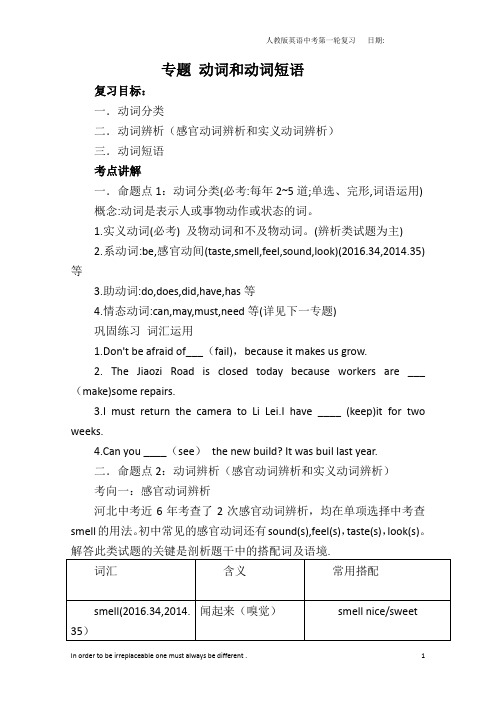
专题动词和动词短语复习目标:一.动词分类二.动词辨析(感官动词辨析和实义动词辨析)三.动词短语考点讲解一.命题点1:动词分类(必考:每年2~5道;单选、完形,词语运用) 概念:动词是表示人或事物动作或状态的词。
1.实义动词(必考) 及物动词和不及物动词。
(辨析类试题为主)2.系动词:be,感官动间(taste,smell,feel,sound,look)(2016.34,2014.35)等3.助动词:do,does,did,have,has等4.情态动词:can,may,must,need等(详见下一专题)巩固练习词汇运用1.Don't be afraid of___(fail),because it makes us grow.2. The Jiaozi Road is closed today because workers are ___(make)some repairs.3.I must return the camera to Li Lei.I have ____ (keep)it for two weeks.4.Can you ____(see)the new build? It was buil last year.二.命题点2:动词辨析(感官动词辨析和实义动词辨析)考向一:感官动词辨析河北中考近6年考查了2次感官动词辨析,均在单项选择中考查smell的用法。
初中常见的感官动词还有sound(s),feel(s),taste(s),look(s)。
解答此类试题的关键是剖析题干中的搭配词及语境.巩固练习单项选择1 .(2016 河北34 题)The air___fresh after the rain. And the sky is blue.A. feelsB. tastesC. smellsD. sounds2. (2014 河北35 题) Mom is making dinner. It___so nice!A. smellsB. tastesC. feelsD. sounds3. The cake ____delicious. I’d like to have another one.A. tastesB. looksC. soundsD. feels4.TFBOYS's songs ____sweet and many of us like lislening to them.A. soundB. feelC. tasteD. look5. This dress is made of silk.It ____comfortable.A. looksB. smellsC. feelsD. sounds考向二:实义动词辨析1.实义动词辨析(6年15考)解答实义动词词义辨析类试题时,首先要分析各个选项的词义,然后分析语境,找出关键词,或者根据前后文语境的逻辑关系来确定正确答案。
助动词与情态动词讲解及练习题

助动词与情态动词讲解及练习题TPMK standardization office【 TPMK5AB- TPMK08- TPMK2C-助动词与情态动词一、助动词助动词有be, have, do, will, shall。
它们本身没有词义,只和实义动词的一定形式构成复合谓语,用来表示时态和语态,构成否定、疑问及加强语气等。
1、be (am, is, are, were, been)(l)“be + -ing”构成进行时态;(2)“be + 过去分词”构成被动语态;(3)“be + 动词不定式”构成复合谓语:①表按计划安排要发生的事。
The prime minister is to visit Japan next year.总理将于明年访问日本。
②用于命令。
You're to do your homework before you watch TV.你得做完了作业才能看电视。
2、have (has, had)(1)“have+过去分词”构成完成时态。
如:Have you seen the film(2)“have been + -ing”构成完成进行时态。
如:What have you been doing these days 这些日子你一直在干什么?3、do (does, did)(1)“do not + 动词原形”构成行为动词的否定式。
如:His brotherdoesn’t like playing basket.;(2)“Do + 主语 + 动词原形”构成行为动词的一般疑问句。
Does he go toschool by bike every day (3)“do + 动词原形”用于祈使句或陈述句中表示加强语气。
如:I did go to see him, but he wasn’t in我确实去看望他了,但他不在家。
Do do some work. 请一定做点什么;(4)代替前面刚出现的动词以避免重复。
动词搭配大全语文二年级
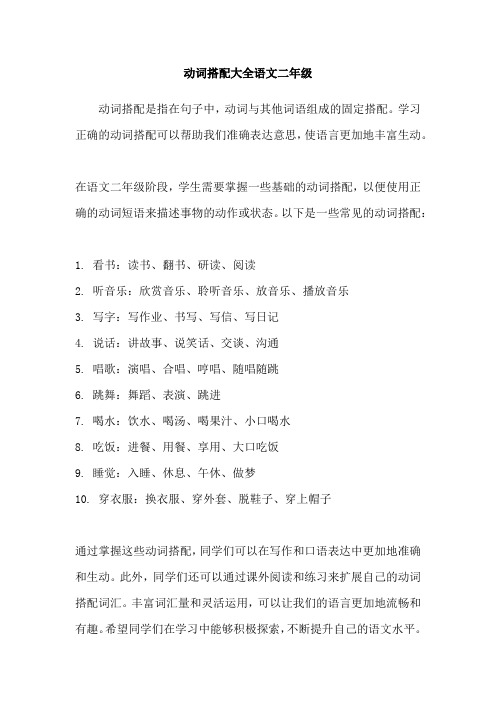
动词搭配大全语文二年级
动词搭配是指在句子中,动词与其他词语组成的固定搭配。
学习正确的动词搭配可以帮助我们准确表达意思,使语言更加地丰富生动。
在语文二年级阶段,学生需要掌握一些基础的动词搭配,以便使用正确的动词短语来描述事物的动作或状态。
以下是一些常见的动词搭配:
1. 看书:读书、翻书、研读、阅读
2. 听音乐:欣赏音乐、聆听音乐、放音乐、播放音乐
3. 写字:写作业、书写、写信、写日记
4. 说话:讲故事、说笑话、交谈、沟通
5. 唱歌:演唱、合唱、哼唱、随唱随跳
6. 跳舞:舞蹈、表演、跳进
7. 喝水:饮水、喝汤、喝果汁、小口喝水
8. 吃饭:进餐、用餐、享用、大口吃饭
9. 睡觉:入睡、休息、午休、做梦
10. 穿衣服:换衣服、穿外套、脱鞋子、穿上帽子
通过掌握这些动词搭配,同学们可以在写作和口语表达中更加地准确和生动。
此外,同学们还可以通过课外阅读和练习来扩展自己的动词搭配词汇。
丰富词汇量和灵活运用,可以让我们的语言更加地流畅和有趣。
希望同学们在学习中能够积极探索,不断提升自己的语文水平。
双宾动词讲解与练习
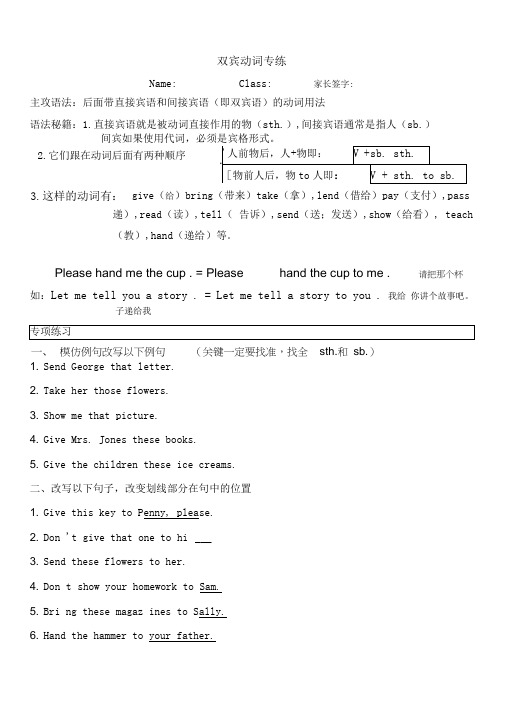
Please hand me the cup . = Pleasehand the cup to me . 请把那个杯 模仿例句改写以下例句(关键一定要找准,找全 sth.和 sb.) 双宾动词专练Name: Class: 家长签字:主攻语法:后面带直接宾语和间接宾语(即双宾语)的动词用法语法秘籍:1.直接宾语就是被动词直接作用的物(sth.),间接宾语通常是指人(sb.) 间宾如果使用代词,必须是宾格形式。
2.它们跟在动词后面有两种顺序 J'人前物后,人+物即: V + s b. sth.[物前人后,物to 人即: V + sth. to sb.3.这样的动词有: give (给)bring (带来)take (拿),lend (借给)pay (支付),pass递),read (读),tell ( 告诉),send (送;发送),show (给看), teach (教),hand (递给)等。
如:Let me tell you a story . = Let me tell a story to you . 我给 你讲个故事吧。
子递给我专项练习1. Send George that letter.2. Take her those flowers.3. Show me that picture.4. Give Mrs. Jones these books.5. Give the children these ice creams.二、改写以下句子,改变划线部分在句中的位置1. Give this key to Penny, please.2. Don 't give that one to hi ___3. Send these flowers to her.4. Don t show your homework to Sam.5. Bri ng these magaz ines to Sally.6. Hand the hammer to your father.7. Don ' t send these tickets to them.8. Can you lend an En glish book to me?9. Pass the ball to her, please.10. Tell the truth to me.三、汉译英。
连系动词的用法讲解及练习题
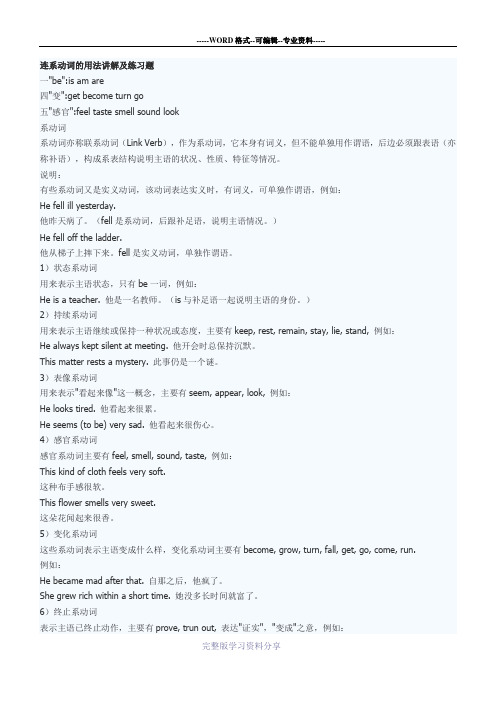
连系动词的用法讲解及练习题一"be":is am are四"变":get become turn go五"感官":feel taste smell sound look系动词系动词亦称联系动词(Link Verb),作为系动词,它本身有词义,但不能单独用作谓语,后边必须跟表语(亦称补语),构成系表结构说明主语的状况、性质、特征等情况。
说明:有些系动词又是实义动词,该动词表达实义时,有词义,可单独作谓语,例如:He fell ill yesterday.他昨天病了。
(fell是系动词,后跟补足语,说明主语情况。
)He fell off the ladder.他从梯子上摔下来。
fell是实义动词,单独作谓语。
1)状态系动词用来表示主语状态,只有be一词,例如:He is a teacher. 他是一名教师。
(is与补足语一起说明主语的身份。
)2)持续系动词用来表示主语继续或保持一种状况或态度,主要有keep, rest, remain, stay, lie, stand, 例如:He always kept silent at meeting. 他开会时总保持沉默。
This matter rests a mystery. 此事仍是一个谜。
3)表像系动词用来表示"看起来像"这一概念,主要有seem, appear, look, 例如:He looks tired. 他看起来很累。
He seems (to be) very sad. 他看起来很伤心。
4)感官系动词感官系动词主要有feel, smell, sound, taste, 例如:This kind of cloth feels very soft.这种布手感很软。
This flower smells very sweet.这朵花闻起来很香。
5)变化系动词这些系动词表示主语变成什么样,变化系动词主要有become, grow, turn, fall, get, go, come, run.例如:He became mad after that. 自那之后,他疯了。
高考语法第六章 动词与动词短语精讲与精练

高考语法|第六章动词与动词短语精讲与精练(最新版)第六章动词与动词短语精讲与精练一、动词与动词短语讲前练:在空格处填入适当的单词(1个)Mr. Green has a beautiful garden. He keeps an eye [1]_________ it carefully every day. He thinks it [2]__________ sense to plant some vegetables in it. And he keeps the vegetables free from chemicals, which does good [3]_________ his health. His neighbors look [4]________ to Mr. Green, who often turn [5]_________ him for advice when they come [6]_______ problems,which can’t be figured [7]_________ on their own. This accounts [8]__________ Mr. Green’s kindness and popularity.Last Sunday I paid a visit to Mr. Green. He gave me some advice on how to get rid [9]______pests and take advantage [10]_________ the modern technology to produce tasty vegetables, which made me pleased.Keys:1.on 2.makes 3.to 4.up 5.to 6.across 7.out 8.for 9.of 10.of【account for说明,解释,导致 figure out 弄清楚,弄明白,计算出,解决】二、动词与动词短语考点精讲:动词与动词短语考点1、动词的分类:1.行为动词(1)及物动词(可以直接带宾语)He gave me some advice on how to get rid of pets.(2)不及物动词(不可以直接带宾语)A traffic accident happened on the Hong Xing road yesterday.2.系动词【系动词后常接形容词做表语,不接副词尤其是以ly结尾的副词作表语】1)、表示“是”的动词be。
双宾动词讲解与练习
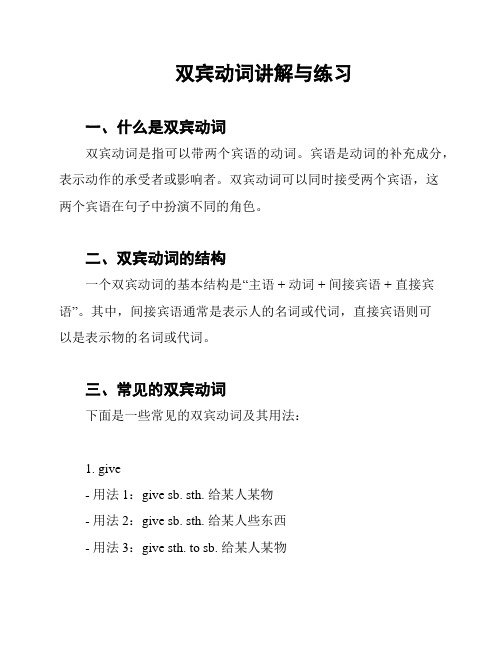
双宾动词讲解与练习一、什么是双宾动词双宾动词是指可以带两个宾语的动词。
宾语是动词的补充成分,表示动作的承受者或影响者。
双宾动词可以同时接受两个宾语,这两个宾语在句子中扮演不同的角色。
二、双宾动词的结构一个双宾动词的基本结构是“主语 + 动词 + 间接宾语 + 直接宾语”。
其中,间接宾语通常是表示人的名词或代词,直接宾语则可以是表示物的名词或代词。
三、常见的双宾动词下面是一些常见的双宾动词及其用法:1. give- 用法1:give sb. sth. 给某人某物- 用法2:give sb. sth. 给某人些东西- 用法3:give sth. to sb. 给某人某物2. show- 用法:show sb. sth. 展示给某人某物 / show sth. to sb. 给某人展示某物3. tell- 用法1:tell sb. sth. 告诉某人某事- 用法2:tell sb. to do sth. 告诉某人做某事4. send- 用法1:send sb. sth. 给某人寄送某物- 用法2:send sth. to sb. 将某物寄送给某人5. bring- 用法1:bring sb. sth. 给某人带来某物- 用法2:bring sth. to sb. 带某物给某人6. write- 用法:write sb. sth. 给某人写信四、练题根据句意,选择合适的双宾动词填空:1. Could you ___________ me your pen?- A) give- B) show- C) tell- D) send2. Can you ___________ the book ___________ me, please? - A) bring / to- B) give / to- C) send / to- D) show / to- A) gave- B) told- C) sent- D) brought4. Please ___________ the letter ___________ your mother.- A) send / to- B) give / to- C) tell / to- D) show / to5. He ___________ her some flowers on her birthday. - A) gave- B) wrote- C) sent- D) brought答案:1. A2. A3. B4. A5. C五、总结通过研究双宾动词的讲解和练,我们了解到双宾动词是指可以带两个宾语的动词。
动词短语专项讲解及练习

【初中英语】动词短语专项讲解及练习一、动词1.—Would you like to try some pizza?—Yes, please. It lovely and nice.A. sounds; seesB. hears; turnsC. looks; smellsD. sounds; watches【答案】C【解析】【分析】句意:-你要尝尝比萨吗?-是的。
它看起来可爱,闻起来好。
A. sounds; sees看起来,看见;B. hears; turns听见,变得;C. looks; smells看起来,闻起来;D. sounds; watches看起来,观看。
没有品尝之前,只能“看、闻”。
故选C。
【点评】考查动词辨析和感官动词作系动词用其后使用形容词作表语,结合句意选择合适的词。
2.— Smoking and drunkenness (酗酒) are both bad for people's health.— Yes. So we should cigarettes and alcohol.A. shut downB. get on withC. stay away fromD. put away【答案】 C【解析】【分析】句意:吸烟和酗酒都有害人们的健康。
--是的。
所以我们应该______香烟和酒。
A.shut down关闭;B.get on with和......相处;C.stay away from远离;D.put away收起来放好。
故选C。
【点评】此题考查固定的短语搭配,平时应多归纳总结并记忆。
3.Luke told me to take a break from running.A. have a breakB. take a restC. have a restD. all the above【答案】 D【解析】【分析】take a break休息一会。
A.have a break /B.take a rest /C.have a rest意思都为:休息一会;D.all the above上述所有的,故选D。
高中动宾搭配不当练习题及讲解
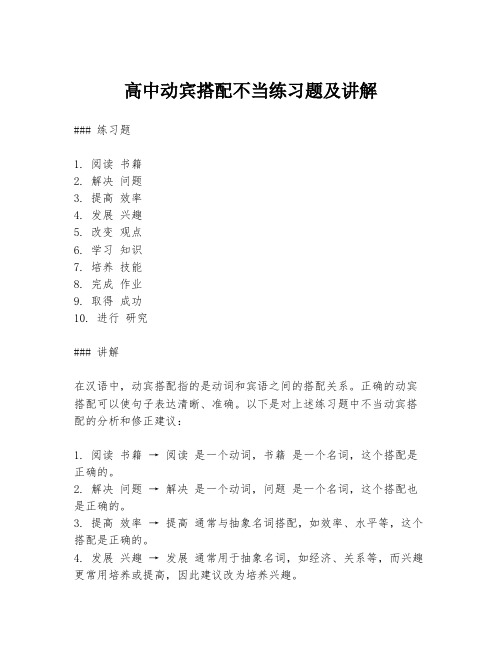
高中动宾搭配不当练习题及讲解
### 练习题
1. 阅读书籍
2. 解决问题
3. 提高效率
4. 发展兴趣
5. 改变观点
6. 学习知识
7. 培养技能
8. 完成作业
9. 取得成功
10. 进行研究
### 讲解
在汉语中,动宾搭配指的是动词和宾语之间的搭配关系。
正确的动宾搭配可以使句子表达清晰、准确。
以下是对上述练习题中不当动宾搭配的分析和修正建议:
1. 阅读书籍→ 阅读是一个动词,书籍是一个名词,这个搭配是正确的。
2. 解决问题→ 解决是一个动词,问题是一个名词,这个搭配也是正确的。
3. 提高效率→ 提高通常与抽象名词搭配,如效率、水平等,这个搭配是正确的。
4. 发展兴趣→ 发展通常用于抽象名词,如经济、关系等,而兴趣更常用培养或提高,因此建议改为培养兴趣。
5. 改变观点→ 改变是一个动词,观点是一个名词,这个搭配是正确的。
6. 学习知识→ 学习是一个动词,知识是一个名词,这个搭配是正确的。
7. 培养技能→ 培养是一个动词,技能是一个名词,这个搭配是正确的。
8. 完成作业→ 完成是一个动词,作业是一个名词,这个搭配是正确的。
9. 取得成功→ 取得是一个动词,成功是一个名词,但通常我们说获得成功或实现成功,因此建议改为获得成功。
10. 进行研究→ 进行是一个动词,研究是一个名词,这个搭配是正确的。
通过上述分析,我们可以看到,动宾搭配的正确性取决于动词和宾语之间的语义是否协调。
在实际使用中,要注意动词和宾语之间的搭配习惯,以及是否符合汉语表达习惯。
主语和am,is,are的搭配讲解
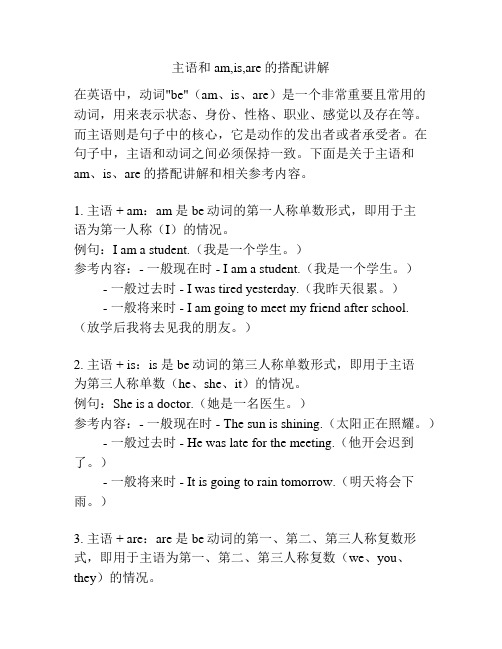
主语和am,is,are的搭配讲解在英语中,动词"be"(am、is、are)是一个非常重要且常用的动词,用来表示状态、身份、性格、职业、感觉以及存在等。
而主语则是句子中的核心,它是动作的发出者或者承受者。
在句子中,主语和动词之间必须保持一致。
下面是关于主语和am、is、are的搭配讲解和相关参考内容。
1. 主语 + am:am 是be动词的第一人称单数形式,即用于主语为第一人称(I)的情况。
例句:I am a student.(我是一个学生。
)参考内容:- 一般现在时 - I am a student.(我是一个学生。
)- 一般过去时 - I was tired yesterday.(我昨天很累。
)- 一般将来时 - I am going to meet my friend after school.(放学后我将去见我的朋友。
)2. 主语 + is:is 是be动词的第三人称单数形式,即用于主语为第三人称单数(he、she、it)的情况。
例句:She is a doctor.(她是一名医生。
)参考内容:- 一般现在时 - The sun is shining.(太阳正在照耀。
) - 一般过去时 - He was late for the meeting.(他开会迟到了。
)- 一般将来时 - It is going to rain tomorrow.(明天将会下雨。
)3. 主语 + are:are 是be动词的第一、第二、第三人称复数形式,即用于主语为第一、第二、第三人称复数(we、you、they)的情况。
例句:We are students.(我们是学生。
)参考内容:- 一般现在时 - They are waiting for the bus.(他们正在等汽车。
)- 一般过去时 - We were happy to see each other.(我们见到对方很开心。
)- 一般将来时 - You are going to have a great time.(你们将会玩得很开心。
动词的ing或ed形式做定语讲解与练习--总结

用作定语时,动词的-ing形式既包括动名词又包括现在分词, 动词的-ed形式仅是动词过去分词。
动词的-ing形式做定语在句中通常有两个位置,如果是单个的动词的-ing形式做定语,常放在被修饰词前做前置定语;如果是动词的-ing形式的短语做定语,常放在被修饰词后做后置定语。
如:1.He is an attacking player.他是一个攻击型的运动员。
(表示运动员的特征)2.He asked an embarrassing question.他提了一个令人难堪的问题。
(表示“令人….”)3.A little child learning to walk often falls.学走路的小孩常常跌跤。
(表示被修饰词的动作或状态,动词短语后置)4.Do you know the number of people coming to the party?你知道来参加晚会的人数吗?(表示被修饰词的动作或状态,动词短语后置)注意:当-ing形式做后置定语时,可以相当于相应的定语从句。
如:1.A young man writing novels came to speak to us yesterday.→A young man who writes novels came to speak to us yesterday.一位写小说的青年昨天来向我们作报告。
2.The girl sitting next to me was my cousin. →The girl who was sitting next to me was my cousin.坐在我旁边的姑娘是我表妹。
另外需要注意的是上面做定语的动词-ing形式表示的动作是正在进行的工作或习惯性的动作,如果和主句谓语的动作不能同时发生时,则不能用-ing形式做定语而必须用定语从句形式。
如:昨天来我们学校的那位教授在明天给我们做报告。
3.The professor who came to our school yesterday will give us a lecture tomorrow.不正确的表述:The professor coming to our school yesterday will give us a lecture tomorrow. 总结:-ing形式做定语通常从以下三方面考查,即: 1)说明被修饰词的性质,特征或用途。
短语动词专项讲解及练习(1)

必备英语【初中英语】短语动词专项讲解及练习一、短语动词1.There was a rainstorm yesterday. The flood _______ the old bridge over the small river.A. washed awayB. went awayC. kept awayD. ran away【答案】A【解析】【分析】句意:昨天有一场暴风雨。
洪水冲走了小河上的旧桥。
wash away冲走;go away离开;keep away使远离;run away逃跑。
根据句意,故答案为A。
【点评】考查动词短语辨析,熟记与away构成的动词短语,在理解句意的基础上判断答案。
2.I a stone in a dark street and hurt my knees.A. fell overB. fell offC. fell away【答案】 A【解析】【分析】句意:我在黑暗中被一块石头……,弄伤了我的膝盖。
A.被绊倒; B.从……落下; C.离开,消瘦。
故选A。
【点评】考查动词短语词义辨析。
3.—I'm sorry that I forgot to turn off the light.—Don't worry. I'll have it __________.A. turn offB. turned offC. turned on【答案】B【解析】【分析】句意:---抱歉我忘记关灯了。
---别担心,我将把它关掉。
turn off关掉;turn on打开。
短语:have sth done,请人做某事,使某事被做。
此处宾语light与动词turn off之间构成被动关系,用过去分词,故答案为B。
【点评】考查过去分词作补语,牢记固定搭配。
4.—Alice, don't put your things here, ___________. —OK, I will.A. put away themB. put on themC. put them awayD. put them on【答案】 C【解析】【分析】句意:一爱丽丝,不要把你的东西放在这儿,把它们放好。
动词搭配技巧初中生物教案

动词搭配技巧初中生物教案
【教学目标】
1.了解动词搭配的概念,掌握常用的动词搭配。
2.通过学习动词搭配技巧,提高写作和口头表达的能力。
【教学重点】
1.掌握常用的动词搭配。
2.了解如何正确使用动词搭配。
【教学难点】
1.识别不同语境下的动词搭配。
2.运用所学的动词搭配进行写作和口头表达。
【教学过程】
一、导入:
老师先播放一个视频或者图片,引发学生对动词搭配的兴趣,激发学生学习的积极性。
二、讲解动词搭配的概念:
1.向学生解释什么是动词搭配,为什么学习动词搭配对于提高表达的能力很重要。
2.给学生举一些常见的动词搭配的例子,让学生感受一下动词搭配的魅力。
三、学习常用的动词搭配:
1.让学生看一些句子,找出其中的动词搭配,然后整理出常用的动词搭配。
2.让学生背诵这些动词搭配,加深记忆。
四、练习:
1.给学生一些句子,让他们根据语境选择合适的动词搭配填空。
2.让学生自己造句,运用所学的动词搭配。
五、总结:
让学生回顾今天所学的内容,总结动词搭配的重要性,鼓励他们在写作和口头表达中多加运用动词搭配。
【课后作业】
1.仿造所学的动词搭配,写一篇短文。
2.整理一些动词搭配的例句,加深记忆。
以上就是本次教学的全部内容,希望学生能够掌握动词搭配的技巧,提高表达能力。
2019中考英语使役动词讲与练外研版

2019中考英语:使役动词(一)have使,让,不用于被动语态○1.have +宾语+done(1)叫、让、请,致使别人做某事,动作的执行者不是主语也不是宾语而是别人。
(强调主观的意志,即主语的意志致使某事发生或被做到)— I’ll have my bike repaired this afternoon. 今天下午我要请人修自行车。
— I have my hair cut every month. 我每个月都理发。
表示主观意志的have也可以用get代替,例如:— Where can I get(have)this printed?我在哪里能(找人)把这份东西打印出来呢?(2)遭遇不幸事件(与主观意志完全无关)— He had his wallet stolen at the station. 他的钱包在火车站不幸遭窃。
— He has his leg broken in a fall.他的腿摔断了。
2.have +宾语+do 让……做某事,动作执行者为宾语— He had her go there. 他让她去那儿。
— I have my children clean the house before you arrive.在你们来之前,我让孩子们把屋子打扫干净了。
这个结构中have有时也可以用get代替,但这时后面的动词不定式需带to,例如:—I got him to write a letter to my boss.我要他写一封信给我的雇主。
3. have +宾语+adj.(形容词)/adv.(副词)/prep.(介词)促使某一动作发生,或使役动作产生的变化结果或状态。
— Please have your money ready. 请准备好钱。
4. have +宾语+doing 让……持续做某事,或处于某种状态。
动作执行者为句子宾语,但动词必须为持续性动词,后面常接时间段。
— He had her standing in the rain for two hours. 他让她在雨中站了两个小时。
- 1、下载文档前请自行甄别文档内容的完整性,平台不提供额外的编辑、内容补充、找答案等附加服务。
- 2、"仅部分预览"的文档,不可在线预览部分如存在完整性等问题,可反馈申请退款(可完整预览的文档不适用该条件!)。
- 3、如文档侵犯您的权益,请联系客服反馈,我们会尽快为您处理(人工客服工作时间:9:00-18:30)。
动词搭配讲与练1. add to增加,增进add … to把…加进…add up相加add up to总计,所有这一切说明1) I don't think these facts will ________ anything.2) Fifty new books have been ________ the library.3) The music _________ our enjoyment of the film.4) You must have made a mistake when you _______ the bill ________.( add up to, added to, add to, added…up )2. break away from打破,脱离,挣脱,改掉break down出毛病,身体(精神)衰弱,分解,拆开break off暂停,中断break in强行进入,插话break into闯入break into pieces成为碎片break out爆发break up捣碎,驱散,瓦解,学期结束,拆散break through突破1) The criminal managed to break _______ ______ the police and ran into the woods.2) When he heard the news, he broke _______ and cried.3) Don't break ________ while others are speaking.4) Why don't you break ________ for a few minutes and have some coffee?5) When does school break ________?6) After harvest we break _________ the soil with a tool pulled by two oxen.( away from, down, in, off, up, up )3. bring up抚养,呕吐,提出bring about造成bring out拿出,出版bring in引入,引进,挣钱bring back使回想起bring down使下降,使倒下1) The shopkeeper brought his price _________ to only five dollars.2) The school has brought _________ new foreign teachers to teach oral English.3) The song brought ___________ happy memories of our schooldays.4) Do you know what brought ___________ this misunderstanding?5) The kind old man agreed to bring __________ the young orphan.6) We decided to bring the matter ___ at the next meeting.7) The wind brought _______ a lot of trees last night.8) Next month they will bring ________ a new edition of the book.( down, in, back, about, up, up, down, out )4. call on号召,拜访(某人)call at拜访、参观(某地)call for去叫某人, 要求, 需要call up使回忆起, 征召入伍call in召集,请某人来call out大喊,高叫call off取消,不举行1) Doctors are often called _____ in the middle of the war.2) Please wait for me at home. I'll call _______ you at your house at seven tonight.3) The trains calls _______ several big cities between Beijing and Guangzhou.4) He called her name __________, but she didn't answer.5) The sports meet was called ____ on account of the rain.( in, for, at, out, off)5. come about发生,出现come down下跌,落,降,传下来come in进来come on来临/ 快点come into (sight/being/existence/use/notice/effect)come out出版,结果是come along一道来,赶快come to达到(an end/an agreement/a stop)苏醒,合计,总共是come over走过来come up发芽,走近come across偶然碰到come back回想起come from来自,源自1) I come _________ the book I lent you last month.2) How did it come _________ that you both got lost? I thought you had a map.3) It suddenly came _________ to me where I had seen the boy before.4) Come __________ now, or else we shall be late.5) He came __________ me like a tiger.6) The price of petrol has come _________ since the beginning of this year.7) The word came __________ use many years ago.8) When the examination result came _________, he had already got a job.9)The bill came __________ over a thousand dollars.10) I sowed the seeds over a month ago, but they haven't come __________ yet.( for, about, back, on, at, down, into, out, to, up )6. cut across抄近路cut down砍倒,削减cut off切断,割掉,断绝关系cut up连根拔除,切碎cut through剪断,凿穿cut out删(省)掉,戒掉cut in插嘴1) Don't cut ___ this tree. It will be very shady in summer.2) You must cut ________ the number of cigarettes you smoke, or it will cause illness.3) We decided to cut _________ the moor(旷野)to the village.4) Cutting the tree ____ means cutting the tree into pieces.5) The electricity was cut ___________ when the lady refused to pay the bill.6) We were having a pleasant conversation when Tom cut __________.(down, down, across, up, off, in )7. die of (disease/hunger/grief/old age)死于(疾病,饥饿,寒冷,情感原因)die from死于(意外事故、情形)die away渐渐消逝die out绝种die down(炉火)渐熄die off逐一死去8. fall behind落后fall over one's feet 跌跤fall down掉下,跌倒fall back撤退,后退1) Babies often fall _____ when they are learning to walk.2) Our team seems to have fallen __________ the others.3) As soon as the enemies fell __________, the people returned to their village.4) She fell__________ the bench and had her leg broken.(down, behind, back, over )9. go in for从事,喜爱,参加go through通过,经受go over复习,检查go up(价格)上涨,建造起来go after追捕,追赶go against违反go ahead先行,开始吧,问吧,说吧go away离开go by时间过去go down下沉,降低,(日、月)西沉go on(with)继续进行go with相配,陪同go without没有,缺少go out外出,熄灭go all out全力以赴go off爆炸,进行,变坏,断电,停止供应go back on背约,食言go beyond超出1) Many new factories have gone __ in the past few years.2) Rents have gone __________ greatly recently.3) Many years have gone ___________ since we first met.4) Let's continue our journey until the sun goes _______.5) His actions went ___________ the will of the people,6) I can't do it, for it goes ___________ my duty.7) Over 100 students went ____________ this entrance examination.8) The bomb went ____________ and killed ten people.9) The buyer went ___________ the car carefully before reaching a decision.10) This tie doesn't go ___________ my blue shirt.11) If you think you can solve the problem, go ______.12) Many students went __________ playing basketball.(up, up, by, down, against, beyond, through, off, over, with, ahead, in for ) 10. get down下来,记下,使沮丧get down to致力于,专心于get on进展,进步,穿上,上车get off脱下,下车get in收集,插(话)get away逃跑,逃脱,去休假get over忘记,越过,克服,从疾病中恢复get along with进展,相处get up起床get through打通电话,完成,通过get round消息传开get close to sth. 接近,几乎get into (trouble)get to (know) get back取回,收回get out1) She spoke so fast that I couldn't get ____ what he said.2) We will find ways to get _________ difficulties.3) The story has got __________, and everyone knows about it.4) When I get _________ with the report, I'll go to the cinema.5) After a delicious meal the two men got __________ to business.6) Don't always get __________ a word when others are speaking.7) It took me a long time to get ___________ such an unpleasant experience. (down, over, round, through, down, in, over)11. give away赠送,泄露,出卖give out发出,疲劳,分发,公布give off发出(光、热、气体)give in (to sb.) 屈服give up放弃,让(座位)1) His accent at last gave him __________.2) The liquid gave ________ a strong smell.3) The headmaster gave ___________ the names of the prize-winners.4) The soldiers gave _________ the town to the enemies.5) Who will help me to give the books ___________?6) Don't believe in those who give his friends ________.7) After a long walk, my strength gave ____________.(away, off, out, up, out, away, out)12. hand in交上,提交hand out分发hand down流传,遗传13. hang about闲逛hang up挂电话14. hold back阻止,隐瞒hold up举起,使停顿hold on别挂电话,等,坚持hold out持续,坚持,伸出hold down控制,镇压1) I'm sure he is holding something _________.2) She managed to hold ______ her emotion until her guests had left. Then she cried.3) Tell him to hold ________ a moment. I'll come soon.4) Our food supply won't hold _________ for more than a few days.5) The train was held ________ as a result of the floods.6) These measures helped to hold ___________ the city's population.7) Hold ___________ your left arm, please.(back, back, on, out, up, down, up)15. keep up (courage, English, spirits)保持,keep up with跟上keep off (grass)不接近,离开keep away from避开,不接近,离…远远的keep out ofkeep to (rules, promise)坚持,遵守keep on继续,坚持下来keep back阻止,留下,隐瞒,扣下keep from克制,阻止1) The angry lady told the strangers to keep ________ from her.2) I can hardly keep ________ my tears after hearing his words.3) Only pride kept her __________ bursting into tears.4) I can scarcely keep __________ asking him what he has done.5) "Don't touch me," screamed the woman, "Keep __________!"6) Keep _________ until you succeed.7) Keep _________ your courage, and you'll succeed in the end.8) The thick coat can keep the cold ___________.9) Always try to keep ___________ the rules when you play a game.10) I can't keep ________ with everything you're doing.(away, back, from, from, off, on, up, out, to, up)16. knock at/on敲knock into撞到某人身上knock down撞倒knock out of把…敲出knock over撞倒knock off停止工作,休息1) The boxer soon knocked his opponent _________.2) The office stuff knocks _________ at six every day.3) Try knocking __________ the window and see if there is anyone indoors.4) He was so absorbed in his book that he knocked __________ the car parked there.(down, off, on, into)17. leave for离开前往leave out删去,遗漏leave behind遗留,忘记拿走leave to留给,遗嘱赠于leave over遗留,剩下,延期1) "Whose name has been left __________?" demanded the teacher.2) When he died, he left all his property _____ his niece.3) He suddenly realized that he had left his umbrella ___________.4) Don't leave this matter _________ until tomorrow.5) Leave some meat ___________ for tomorrow.6) Those are questions left _________ by history.(out, to, behind, over, over, over)18. look up查找,向上看look through翻阅,浏览look on旁观look on…as看作look into调查look after/ at / for 照顾/看/寻找look out(for)当心look about / around/round四下查看look down upon瞧不起look back upon回忆,回顾look ab. up and down仔细打量某人look ab in the face/eyes直视某人1) I spent two hours looking ______ the students' papers.2)Look _______! There is a big hole in front.3) He took part in the game, and the rest of us just looked ______ and cheered for him.4) The old man looked _____ upon the days of his youth.5) She was so snobbish(势利)that she looked __________ upon all his neighbours.6) The police promised to look __________ the case as soon as possible.7) He looked __________ but saw nobody, and he listened but hear nothing.(through, out, on, back, down, into, about/around/round)19. make up编造,配制,打扮,组成make up for弥补make into / of / from 制成make out弄懂,发现,看出,填写,开列(清单)make for走向,驶往,促使1) Can you make this length of cloth __________ a suit?2) I asked the driver if he was making ___________ London?3) My father made __________ a check for me to buy the camera.4) We must make the loss _________ next week./ He tried hard to make ________ for the damage he had done.5) He made __________ a story, which I found hard to believe.6) Someone is coming, but I can't make ___________ who it is.(into, for, out, up/up, up, out)20. pass away去世pass by经过pass down(on)…to传给pass through经历pass over漠视,忽视1) The old clock has been passed ________ to me from my grandfather's grandfather.2) The man passed ___________ last week in peace.3) We are passing ____________ difficult times.4) The secretary passed ___________ the details in the first part of his report.(down, away, through, over)21. pay back还钱,报复pay for付钱,为…受惩罚,因…得到报应pay off还清1) How much did you pay __________ the dictionary?2) You should pay _________ the money you borrowed from me.3) I'll pay him ____________ for all his crimes(罪行) against me.4) Some day, you'll pay __________ what you have done today.5) Has she pay ____________ the debt yet?(for, back, back, for, off)22. pick up拾起,获得(information),接人,站起,收听,自然习得(language/knowledge),恢复重获(pick up health)pick out挑选,辨认,看出1) I picked the information __________ while waiting in the queue.2) My friend has arranged to pick me _________ at 6:00.3) The patient has picked _________ health during the last two weeks.4) She picked _______ the most expensive pair of shoes.5) I can't pick John ___________ in the crowd.6) Can I pick __________ VOA with this short-wave radio?7) He fell down suddenly, but picked himself ___________ quickly.(up, up, up, out, out, up, up)pick cotton/flower/leaves/words选词23. put up搭起,张贴,举起,安装,投宿,安排住下put up with忍受put out伸出,扑灭put off推迟put into放进,翻译put away放好,存钱put down记下,平息put on穿戴,上映,增加(put on weight/speed)put forward 提出,提前put through 接通电话put aside放到一边put back放回1) He put _________ half his wage every week.2) The government soon put __________ the revolt(暴乱).3) Put your watch __________. It's slow.4) He put __________ his hand for me to shake.5). Please put me __________ to Extension(分机)2.6) We put ___________ for night at the village inn.7) He is very proud, and he often put _________ airs.(摆架子)8) We had a telephone put _____________ in our office.9) I can't put __________ with your laziness.(away, down, forward, out, through, up, on, up, up24. pull down拆掉,推翻pull on匆匆穿上/ off 脱pull in进站pull out取出,(火车)离站pull down往下拉,拆毁pull over驶到一边pull through恢复健康,渡过难关,脱离险境pull up(使)停住1) The train slowly pulled __________ and disappeared in the distance.2) All the old houses here have now been pulled ______, and new ones are to be built.3) The car pulled _________ when I blew the horn.4) The doctor thinks the man will pull __________.5) The driver pulled ________ at the traffic lights.(out, down, over, through, up)25. push over推倒,刮倒push ahead(on, forward)继续前进,坚持下去push through排除困难办好谋事,努力设法通过,挤过1) We've decided to push __________ with our plan to build a new road2) Many trees were pushed __________ in the hurricane.3) They were determined to push the new rules ________ at any cost..4) Take care not to push the baby _________.5) They pushed ___________ the crowd and at last reached us.(on, over, through, over, through )26. run across偶然碰到run after追逐,追捕run away逃跑run for竞选run into偶然碰到(困难)遇见(人),相撞run out of用完1) If you drive so fast, you'll run _________ someone some day.2) I ran __________ a friend of mine in the exhibition.3) Our water has run __________. Can you fill up some more bottles?4) Why do you always run __________ adventure?5) He didn't want to run ___________ president that year.6) In that way you will only run __________ difficulties.( into, across/into, out, after, for, into)27. see off送行see through看透,识破see to照料,照管28. send for派人去请send off送行send out发出(光亮)等send up发射29. set up建立set off出发,触发,引起set out动身,着手(to do),陈述set about开始着手(doing)set to work(n.)开始做set back拨回,使推迟1) I shall set my watch ___________ by five minutes.2) We set __________ reading the text aloud immediately the bell rang.3) We set _________ at daybreak yesterday and we've been travelling ever since then.4) I set __________ to advise him not to drink.5) What were the reasons he set ___________ in his report?6) The president set __________ a special group of soldiers to guard him.7) The unpopular law set _________ a series of protests.(抗议)(back, about, off/out, out, out, up, off)30. take off脱掉,起飞take on呈现take away拿走take in吸收,领会take up从事,占用(时间空间)take down记录,取下take back收回take for误认为take along随身带take over接管take out1) I take _________ all I said about his dishonesty.2) He went to the shelf and took __________ a book of poems.3) At first I took him _________ a doctor.4) I can see that most of you have taken ________ everything that the teacher taught.5) Bill has now taken __________ his father's business.6) My job takes __________ most of my time.7) The boss took ____________ twenty people for his new company.(back, down, for, in, over, up, on)take charge of负责, take sth. for granted想当然, take hold of抓住, take pride in 以… ……为自豪, take the place of, 代替take turns to do轮流做, take office就职31. think of想起think of…as把…看作think out想出think up想出think about考虑think over仔细考虑think well of sb. 对某人看法好32. turn off / on打开turn over翻身,反复考虑,翻(书页),翻转turn out证明为,结果,制造成品turn to转向,求助turn down调低,拒绝turn against变得敌视,反对turn away打发走,驱逐,转过脸去turn back返回,转回去turn round转过身来turn up向上翻,露面,出现,音量调大turn in上缴turn upside down把倒置,弄得乱七八糟1) The child turned __________ its mother for comfort.2) Turn ___________ and let me see your face.3) However much he turned the problem ________ in mind, he could find no satisfactory solution.4) The English evening party turned _________ a great success.5) The sight of the accident was too much for her to bear, and she turned _______.6) The football stadium was full, and many people had to be turned __________.7) The army turned him ___________ on account of (因为) his poor health.8) She turned the whole house ___________ in her search for her missing purse.9) Where did your purse turn ____________? I found it in the snow.10) The villagers suddenly turned __________ the foreigners who lived nearby.11) The factory turns ____________ 2000 new cars last year.(to, round, over, out, away, away, down, upside down, up, against, out)water, attack, keep, attract, base26. Our army _____ the enemy yesterday.27. His speech at the meeting yesterday _______ the expert's interest.28. The film is _______ on a novel written by Lu Xun.29. The flowers need ______ every day, or they'll die soon.30. The big bowl on display was used for ______ wine warm in old days.live, lay, lie, million, happen31. ________ of trees have been planted in the north of China.32. These eggs were _______ two weeks ago by the hen.33. He was tired and _______ down to rest.34. There are a lot of people standing on the road, go and see what's _____.35. Are there any ______ fish left in the lake?make sure, find out, get on or off, talk on and on, more or less36. I can earn 20 yuan ______ a night as a waiter in a restaurant.37. The two old men met at the railway station. They were so happy that they ________ and forgot the time.38. The train stopped at a very small station. No one ______.39. I think the door is locked, but I'd better go and ________.40. He went home in a hurry to _______ if it was true.make up, clean up, pick up, open up, look up41. If you don't know his telephone number, you can _____ it _______ in my phone book.42. More and more foreign companies come to China to _____ their new factories.43. We should not litter the seas but should _______ the dirty parts.44. Uncle Wang ______ an interesting story for the children last week.45. On his way to school, Xiao Ming found a wallet lying on the ground, he _____ it ______ and handed it in.。
